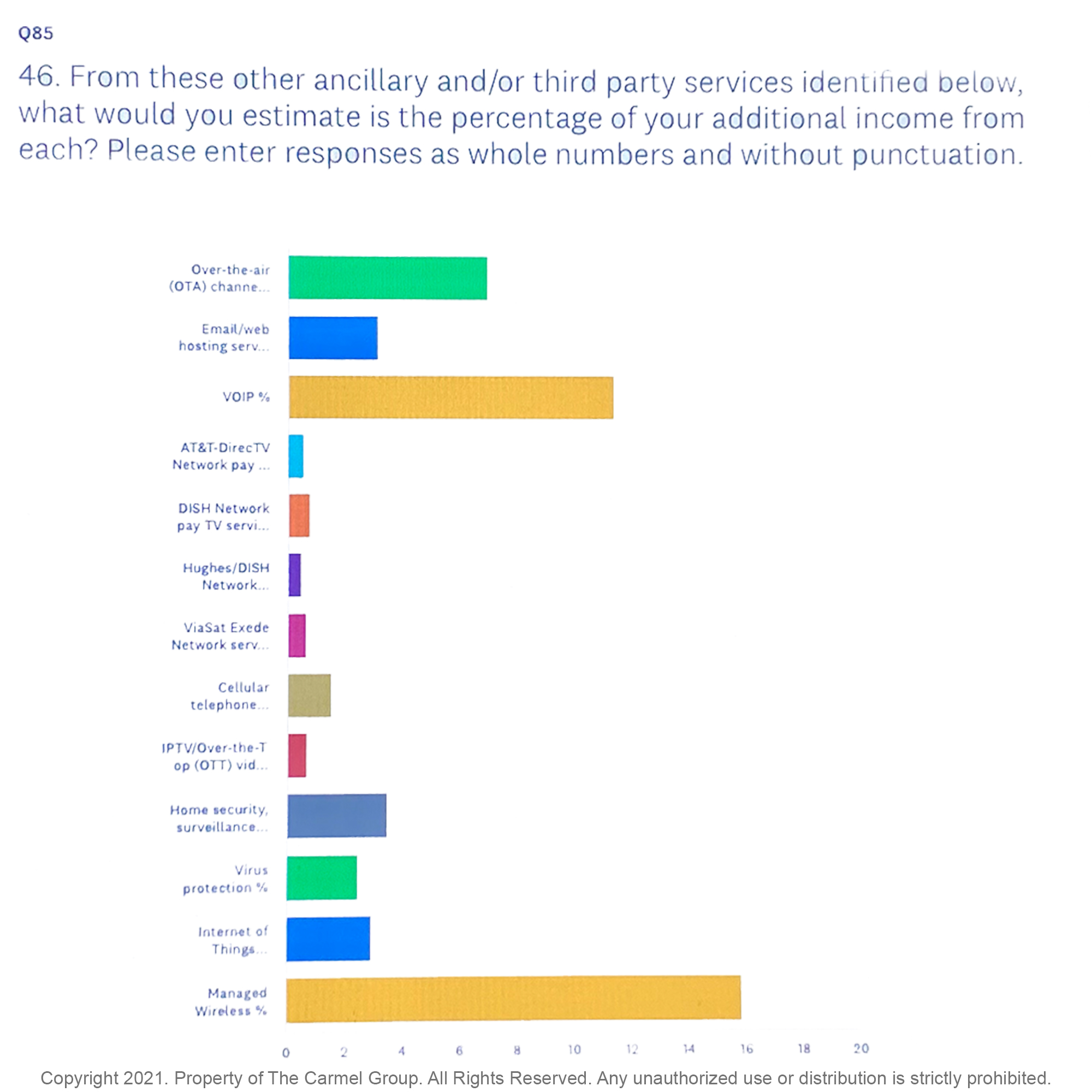Broadband Changes Afloat
Better ARPU plus a better name?
The smarter way to stay on top of the multichannel video marketplace. Sign up below.
You are now subscribed
Your newsletter sign-up was successful
From a recent Las Vegas visit to the fixed wireless and hybrid fiber wireless association’s 2021 WISPAPALOOZA convention, a couple of fascinating new pieces of information arose (or were reinforced).
Profitability of IT Home Services
First, was a growing confirmation among wireless internet service providers (WISPs), AKA “operators,” that the top grossing among ancillary services they offer is the provision of Internet Technology (IT) services on a regular, repeating basis. Provided by WISP installers, this mostly residential service is delivered typically in the form of a monthly warranty and broad IT coverage charge of less than $10/month. This added offer is also considered the most profitable among others, such as 1) security and monitoring, 2) voice-over-internet protocol (VoIP) and 3) virtual private networks. The only so-called “added service” that is consistently more profitable — and is not yet regularly provided by most hybrid fiber wireless operators — is that of a so-called “upgrade” basic broadband connectivity, delivered as a business service to a new business customer.
And although not tested, one guesses that since most hybrid fiber wireless operators are locally based and trusted, most customers would feel more comfortable letting those technicians and installers regular access to their homes than they might for a distant-based, large Midwest, Southern or East Coast-based incumbent cable or satellite provider.
Data from The Carmel Group’s two 2021 independent surveys of both vendors and operators shows further that a handful of the other services provided for the purpose of customer acquisition, retention, satisfaction and revenues are the provisioning of local and cable and other video programming, as well as web hosting, and repair and maintenance of consumer computers and other tech equipment not provided by the operator. A new offering mentioned by a greater number of respondents this time around, is that of provisioning services around the technology and software that makes up the Internet of Things (IoT).

WISPA’s Name Doesn’t Work Well
And what was second?
For years, even when speaking at a prior WISPAPALOOZA event in 2018, I have joined many among WISPA’s leaders and decisionmakers in lobbying for the WISPA organization to change its name.
For one, the word “wisp” is, well, weak. It‘s very definition intends so. Formally, according to Merriam Webster, “wisp” means frail, slight, fleeting, light and impliedly insignificant. Additionally, the acronym, WISP, stands for “wireless internet service provider.” Yet, in contradiction, it has long been clear that for now and well into the future, the huge majority of fixed wireless operators already include and are implementing more or deploying fiber. Today, our data shows that few systems do not include measurable connectivity via fiber. Indeed, the formal title of The Carmel Group’s most recent industry report is The 2021 Fixed Wireless and Hybrid Fiber Wireless Report.
The smarter way to stay on top of the multichannel video marketplace. Sign up below.
Furthermore, The Carmel Group’s question number 82 from its 2021 WISPA-affiliated independent survey of hundreds and hundreds of both operators and vendors showed that by year-end 2023, 20% of the infrastructure that makes up every system will involve fiber. Far smaller percentages were offered by respondents for systems that will add GEO satellites, LEO satellites, cable and independent third-party fiber services, for example.
So what would the new trade group name be? Many names, such as “Competitive Broadband Provider“ (CBP), “Broadband Wireless Access Provider” (BWA), “Fixed Wireless Access” (FWA), and “Wireless Local Loop” (WLL) were offered in the past. Yet, of late, the best I have heard is plain and simple: just call the broadband industry served by WISPs “ISP.” ISP is, of course, short for “Internet Service Provider.” Thus, the new name for WISPA would be ISPA, short for the Internet Service Providers’ Association. Or even BISPA, short for Broadband Internet Service Providers’ Association?
That way, the focus is always in the future on what they provide, which is the broadband content. And in turn the focus is never again on how they provide it, e.g., whether wirelessly or via wireline or via satellite.
This presents a very elegant, logical and positively emotional solution. The Carmel Group truly hopes this name and identity change happens soon.
Meanwhile, see you at the next WISPA/ISPA/BISPA show, “WISP/ISP/BISPA America 2022.” It is scheduled to be held in New Orleans, Louisiana, March 14-17.
Jimmy Schaeffler (AKA “Shamus Schaeffler”) is chairman and CSO of The Carmel Group, a west coast-based consultancy founded in 1995. He can be reached at jimmy@carmelgroup.com.
